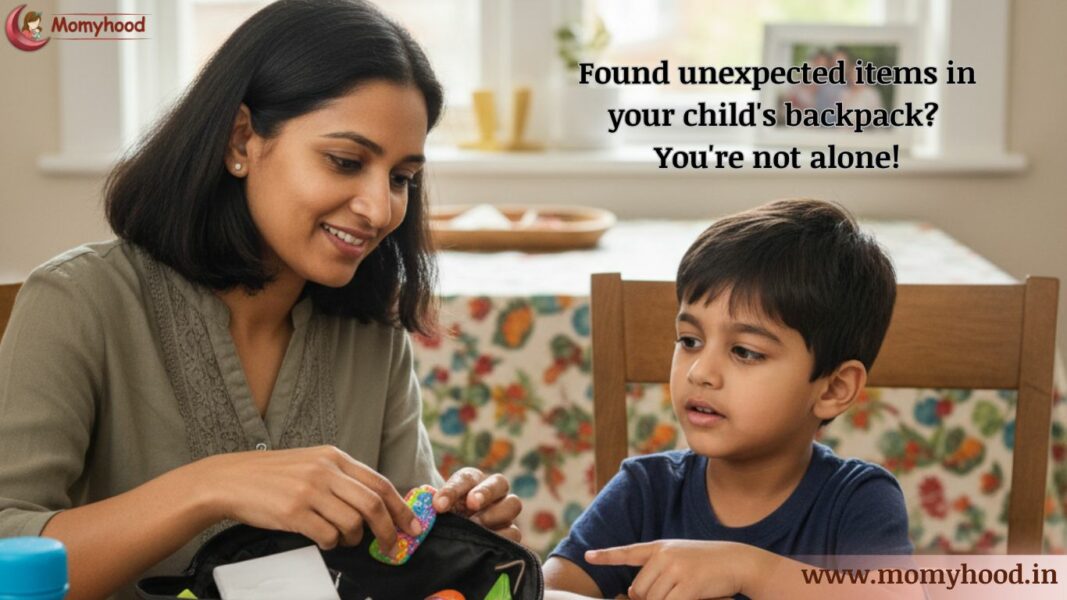I’ll never forget the day I found three erasers, two pencils, and a sharpener that weren’t ours in my son’s backpack. My heart sank. Was my child taking things from school deliberately? I felt ashamed, scared, and honestly, a bit panicked about what the teacher would think.
If you’re reading this because you’re dealing with this issue, let me tell you – you’re not alone, and your child is not “bad.” I’ve been exactly where you are, and I want to share what actually worked for us.
My Child Taking Things from School – The Beginning
My son, Arjun, was in 3rd standard when this started. He’d come home with pencils, rubbers, and small stationery items that didn’t belong to him. I tried everything initially – soft conversations, stern warnings, even bought him every stationery item he could possibly want. But the behavior continued anyway.
The worst part? His teacher wasn’t particularly warm, and I lived in constant fear of a complaint. Here was my brilliant boy, doing so well academically and behaviorally, yet this one habit was making me question everything.
Why Is This Happening?
Before I share what worked, let me tell you what I learned that changed everything: this behavior is rarely about stealing.
At 6-9 years old, kids are still learning about ownership. My son wasn’t being defiant – he genuinely didn’t understand the difference between “shared classroom items” and “someone else’s personal items.” Sometimes he’d see a cool eraser, impulsively put it in his pocket, and completely forget about it.
Understanding this helped me stop taking it personally and start addressing the issue effectively.
📣 Loved what you read? Want to go deeper into conscious parenting? ✨ The Power of Manifestation in Parenting is now available — A soulful guide packed with real-life tools like affirmations, energy shifts, and sleep talk that I personally use with my son, Hitarth. 💛 Start your journey toward calmer, connected parenting today. 🎉 Launch Offer: Only ₹99 (limited-time price!) 📲 Instant download. No waiting. 👉 Grab your copy now!.
The 5 Strategies That Stopped My Child Taking Things from School
1. The Daily Bag Check Ritual
This was our game-changer. Every single day after school, we’d sit together and check his bag. Not as punishment, but as routine.
“Let’s see what came home with you today!” I’d say cheerfully.
At first, we found items almost daily. But I never scolded. I’d simply ask, “Is this yours or someone else’s?” Then we’d set it aside to return the next day. Within three weeks, the incidents reduced dramatically.
2. I Stopped Shaming and Started Teaching
This was hard for me. When this becomes a pattern, the instinct is to show them how wrong it is through anger. But shame doesn’t teach – it just makes kids hide things better.
Instead, I’d say: “I see you brought home Rahul’s pencil. That happens sometimes! Tomorrow morning, let’s put it in your bag so you can give it back.”
No lectures. No disappointment. Just matter-of-fact problem-solving.
3. The Empathy Questions
Rather than saying “stealing is wrong,” I asked questions:
- “How do you think Priya felt when she couldn’t find her eraser?”
- “Remember when you lost your blue pen? How did that feel?”
- “What could you do if you accidentally bring home something that’s not yours?”
These conversations built his understanding from the inside, which lasted much longer than my rules ever did.
4. We Role-Played Solutions
Children often don’t know what to do when they realize the mistake. So we practiced:
Me: “Oh no, you just realized this isn’t your pencil. What should you do?”
Him: “Um… hide it?”
Me: “Well, you could! But then Maya won’t have her pencil. What else could you do?”
Him: “Give it back?”
Me: “Yes! How would you do that?”
We’d practice approaching the teacher, approaching the child, saying “I brought this by mistake.” These rehearsals gave him confidence to handle the situation himself.
5. I Named EVERYTHING
I labeled every single item with his name using a permanent marker. This visual reminder helped him distinguish “mine” from “not mine” at a glance. Clear ownership markers make a huge difference.
Also read: Why do young children sometimes steal? And what should parents do about it?
The Turning Point
About six weeks into our new approach, something beautiful happened. Arjun came home and immediately said, “Mumma, I almost brought home someone’s rubber by mistake, but I remembered it wasn’t mine and put it back!”
I nearly cried. Not because he’d almost taken it, but because he’d caught himself.
That’s when I knew we’d turned a corner.
What About the Teacher?
I was terrified to approach his teacher about my child taking things from school, but finally, I sent a brief note: “We’re working with Arjun on making sure he brings home only his belongings. If you notice any mix-ups, please let us know so we can address it together.”
To my surprise, she responded kindly. Turns out, a child taking things from school is so common that teachers have seen it countless times. Making her an ally rather than someone to hide from was liberating.
If the Behavior Continues
If you’ve tried everything and the problem persists, here’s what I’d suggest:
Be patient. This is a developmental stage for most kids. Arjun still occasionally brought something home accidentally even after months of working on it.
Stay consistent. The daily bag check felt tedious, but consistency is what built the new habit.
Don’t catastrophize. I spent so many nights worrying about what this meant for his future. Looking back, I wish I’d trusted the process more. This behavior doesn’t define your child.
Consider underlying needs. In rare cases, children persistently exhibiting this behavior might be seeking attention, feeling anxious about scarcity, or struggling with impulse control issues that need professional support. But for most kids, it’s simply developmental.
Related read: How to Deal with a Lying Child: A Mother’s Honest Journey
Where We Are Now
Arjun is older now, and this phase is completely behind us. He’s honest, responsible, and sometimes even reminds me when I accidentally bring home a pen from the bank!
The shame I felt when dealing with my child taking things from school seems almost silly now. This was just one small chapter in his growing up – a chance to teach ownership, empathy, and accountability.
If you’re in the thick of it right now, please know: this will pass. Your child is not broken. You’re not failing. This is just childhood, messy and imperfect and ultimately beautiful.
Key Takeaways for Parents Dealing with Child Taking Things from School
When facing the challenge of child taking things from school:
- Understand it’s usually developmental, not intentional theft
- Create a daily routine to check bags together
- Replace shame with curiosity and teaching
- Build empathy through questions, not lectures
- Label all belongings clearly
- Role-play appropriate responses
- Partner with teachers instead of hiding from them
- Be patient – lasting change takes time
Your child taking things from school doesn’t make them a thief. It makes them a normal kid who needs guidance. And you, worried parent searching for answers about child taking things from school at midnight? You’re exactly the kind of parent who’ll help them through this.
I promise, one day this problem of child taking things from school will be just a funny story you tell. Until then, be gentle with yourself and your little one.
Have you dealt with this issue? What worked for your family? Share your experiences in the comments – we’re all learning together.
Your comments and shares do more than just support our blog—they uplift the amazing moms who share their stories here. Please scroll down to the end of the page to leave your thoughts, and use the buttons just below this line to share. Your support makes a big difference!



